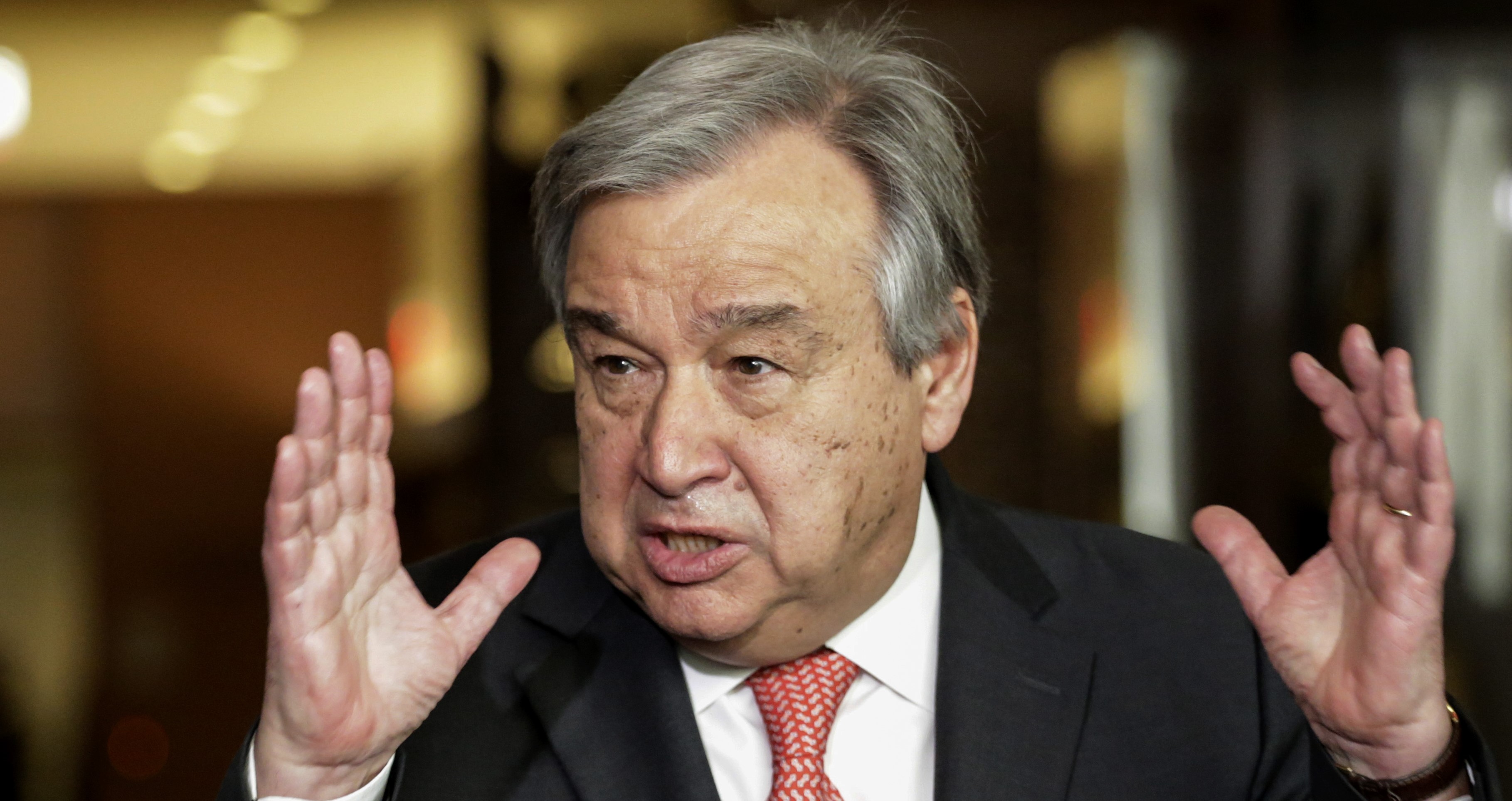Antonio Guterres: Will new secretary-general 'kick UN up the backside'?
Syria will be a top priority when Portugal's former prime minister replaces Ban Ki-moon in January

Race to become next UN secretary general gets nasty
26 September
The United Nations Security Council will vote in the fifth of a series of elections to name the next secretary general, but the process has been marred in controversy.
"Hacked emails, bogus Twitter accounts, smear allegations and backroom deals," says The Guardian. "Welcome to the race for the international community's top diplomatic job."
The Week
Escape your echo chamber. Get the facts behind the news, plus analysis from multiple perspectives.

Sign up for The Week's Free Newsletters
From our morning news briefing to a weekly Good News Newsletter, get the best of The Week delivered directly to your inbox.
From our morning news briefing to a weekly Good News Newsletter, get the best of The Week delivered directly to your inbox.
Meanwhile, the organisation faces major criticism in its failure to address the ongoing Syrian conflict, the refugee crisis and the situation in Ukraine.
How does the selection process work?
There are nine candidates vying for the position, four men and five women. There have already been several rounds of voting – known as straw polls - and two candidates have withdrawn. The final decision will be made by the five permanent members at a Security Council meeting next month.
Who is in the running?
A free daily email with the biggest news stories of the day – and the best features from TheWeek.com
Portugal's Antonio Guterres, the former UN high commissioner for refugees, is favourite to succeed Ban Ki-moon, whose term ends in December.
However, the UN's "secretive ways" mean he could still lose, says Bloomberg. "The horse trading behind the scenes can see an early favourite displaced by a compromise candidate who won't upset a delicate power balance between the five veto-wielding nations: US, Russia, France, China and the UK," it says.
Guterres faces tough competition from Slovakia's foreign minister, Miroslav Lajcak, and his Serbian counterpart Vuk Jeremic, although experts predict he will be vetoed by Washington.
The other competitors are Macedonian diplomat Dr Srgjan Kerim, Bulgarian politician and Unesco director general Irina Bokova, former president of Slovenia Danilo Turk, Moldova's former acting prime minister Natalia Gherman, former New Zealand prime minister Helen Clark and the foreign minister of Argentina Susana Malcorra.
"The hope that a strong field of women contenders would produce the UN's first female secretary general looks to have been rebuffed," says The Guardian. "The first three spots are taken by men."
Why has it been so controversial?
Bokova alleges that an "undignified" smear campaign is being carried out to have her replaced with Kristalina Georgieva, the EU budget commissioner, as the official candidate. But she has also cried foul, after the email account of one her staffers was hacked.
A Twitter account in Guterres's name – which proved to be fake – said he had won the support of Russia, adding to confusion and dirty tricks surrounding the race.
"The eventual winner of the contest will ascend to become a secular saint, an ambassador of peace and voice of the poor and downtrodden, says The Guardian.
"But the road to such a lofty position is paved with landmines and booby traps."
Former New Zealand PM Helen Clark enters race to be UN secretary general
5 April
Helen Clark, the former prime minister of New Zealand, has said she will apply for the position of United Nations secretary general when Ban Ki-moon retires in December.
"In the normal course of events, I would like to see women have a fair chance, an equal chance at every leadership position," she said, announcing her decision to run for the position. "The position of secretary general is about giving a voice to seven billion people who look to the UN for hope and support."
Three other women and four men are so far battling it out for the position.
"Her high-profile entry into the competition is certain to increase pressure among the power brokers of the UN to appoint a woman as the leading face of diplomacy on the global stage," reports The Guardian.
Clark told the BBC she would introduce sweeping reforms and expand the security council beyond its five permanent members.
"The security council reflects the geo-political realities of 1945," she said. "I would like it to reflect the 21st-century world which we live in today."
Under her reign, Germany, Japan, India, Brazil and two African states would join the top table.
However, it is the existing permanent members who are likely to select the next secretary general. Although their choice is subject to ratification by all members of the general assembly, it has never before been overturned.
There are signs of change, however. "In what amounts to a quiet insurrection, the general assembly has devised its own process for the appointment of Ban's replacement," The Guardian says.
Candidates have been listed on a website set up by Danish politician Mogens Lykketoft and are required to submit a 2000-word essay outlining their qualifications for the role. They will also take part in a two-hour question-and-answer session before the UN's trusteeship council in New York and two public hustings organised by The Guardian in New York and London.
"This is a leap forward in terms of transparency. For the first time in history, the process is being brought into the open," said Dan Thomas, a spokesman for the president of the general assembly.
-
 What is at stake for Starmer in China
What is at stake for Starmer in ChinaToday’s Big Question The British PM will have to ‘play it tough’ to achieve ‘substantive’ outcomes, while China looks to draw Britain away from US influence
-
 How the ‘British FBI’ will work
How the ‘British FBI’ will workThe Explainer New National Police Service to focus on fighting terrorism, fraud and organised crime, freeing up local forces to tackle everyday offences
-
 The best family hotels in Europe
The best family hotels in EuropeThe Week Recommends Top kid-friendly hotels with clubs, crèches and fun activities for children of all ages – and some downtime for the grown-ups
-
 China’s Xi targets top general in growing purge
China’s Xi targets top general in growing purgeSpeed Read Zhang Youxia is being investigated over ‘grave violations’ of the law
-
 Panama and Canada are negotiating over a crucial copper mine
Panama and Canada are negotiating over a crucial copper mineIn the Spotlight Panama is set to make a final decision on the mine this summer
-
 Why Greenland’s natural resources are nearly impossible to mine
Why Greenland’s natural resources are nearly impossible to mineThe Explainer The country’s natural landscape makes the task extremely difficult
-
 Iran cuts internet as protests escalate
Iran cuts internet as protests escalateSpeed Reada Government buildings across the country have been set on fire
-
 US nabs ‘shadow’ tanker claimed by Russia
US nabs ‘shadow’ tanker claimed by RussiaSpeed Read The ship was one of two vessels seized by the US military
-
 How Bulgaria’s government fell amid mass protests
How Bulgaria’s government fell amid mass protestsThe Explainer The country’s prime minister resigned as part of the fallout
-
 Femicide: Italy’s newest crime
Femicide: Italy’s newest crimeThe Explainer Landmark law to criminalise murder of a woman as an ‘act of hatred’ or ‘subjugation’ but critics say Italy is still deeply patriarchal
-
 Brazil’s Bolsonaro behind bars after appeals run out
Brazil’s Bolsonaro behind bars after appeals run outSpeed Read He will serve 27 years in prison